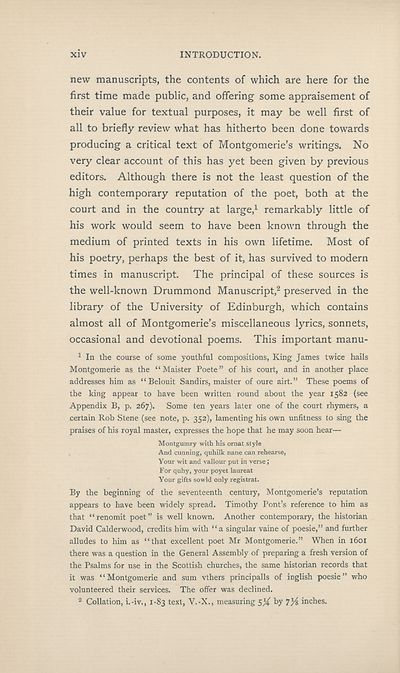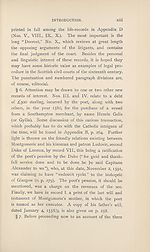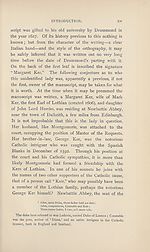Download files
Complete book:
Individual page:
Thumbnail gallery: Grid view | List view

XIV
INTRODUCTION.
new manuscripts, the contents of which are here for the
first time made public, and offering some appraisement of
their value for textual purposes, it may be well first of
all to briefly review what has hitherto been done towards
producing a critical text of Montgomerie’s writings. No
very clear account of this has yet been given by previous
editors. Although there is not the least question of the
high contemporary reputation of the poet, both at the
court and in the country at large,1 remarkably little of
his work would seem to have been known through the
medium of printed texts in his own lifetime. Most of
his poetry, perhaps the best of it, has survived to modern
times in manuscript. The principal of these sources is
the well-known Drummond Manuscript,2 preserved in the
library of the University of Edinburgh, which contains
almost all of Montgomerie’s miscellaneous lyrics, sonnets,
occasional and devotional poems. This important manu-
1 In the course of some youthful compositions, King James twice hails
Montgomerie as the “ Maister Poete” of his court, and in another place
addresses him as “ Belouit Sandirs, maister of cure airt.” These poems of
the king appear to have been written round about the year 1582 (see
Appendix B, p. 267). Some ten years later one of the court rhymers, a
certain Rob Stene (see note, p. 352), lamenting his own unfitness to sing the
praises of his royal master, expresses the hope that he may soon hear—
Montgumry with his ornat style
And cunning, quhilk nane can rehearse,
Your wit and vallour put in verse;
For quhy, your poyet laureat
Your gifts sowld only registrat.
By the beginning of the seventeenth century, Montgomerie’s reputation
appears to have been widely spread. Timothy Font’s reference to him as
that “renomit poet” is well known. Another contemporary, the historian
David Calderwood, credits him with “a singular vaine of poesie,” and further
alludes to him as “that excellent poet Mr Montgomerie.” When in 1601
there was a question in the General Assembly of preparing a fresh version of
the Psalms for use in the Scottish churches, the same historian records that
it was “Montgomerie and sum vthers principalis of inglish poesie” who
volunteered their services. The offer was declined.
2 Collation, i.-iv., 1-83 text, V.-X., measuring 5by 7J& inches.
INTRODUCTION.
new manuscripts, the contents of which are here for the
first time made public, and offering some appraisement of
their value for textual purposes, it may be well first of
all to briefly review what has hitherto been done towards
producing a critical text of Montgomerie’s writings. No
very clear account of this has yet been given by previous
editors. Although there is not the least question of the
high contemporary reputation of the poet, both at the
court and in the country at large,1 remarkably little of
his work would seem to have been known through the
medium of printed texts in his own lifetime. Most of
his poetry, perhaps the best of it, has survived to modern
times in manuscript. The principal of these sources is
the well-known Drummond Manuscript,2 preserved in the
library of the University of Edinburgh, which contains
almost all of Montgomerie’s miscellaneous lyrics, sonnets,
occasional and devotional poems. This important manu-
1 In the course of some youthful compositions, King James twice hails
Montgomerie as the “ Maister Poete” of his court, and in another place
addresses him as “ Belouit Sandirs, maister of cure airt.” These poems of
the king appear to have been written round about the year 1582 (see
Appendix B, p. 267). Some ten years later one of the court rhymers, a
certain Rob Stene (see note, p. 352), lamenting his own unfitness to sing the
praises of his royal master, expresses the hope that he may soon hear—
Montgumry with his ornat style
And cunning, quhilk nane can rehearse,
Your wit and vallour put in verse;
For quhy, your poyet laureat
Your gifts sowld only registrat.
By the beginning of the seventeenth century, Montgomerie’s reputation
appears to have been widely spread. Timothy Font’s reference to him as
that “renomit poet” is well known. Another contemporary, the historian
David Calderwood, credits him with “a singular vaine of poesie,” and further
alludes to him as “that excellent poet Mr Montgomerie.” When in 1601
there was a question in the General Assembly of preparing a fresh version of
the Psalms for use in the Scottish churches, the same historian records that
it was “Montgomerie and sum vthers principalis of inglish poesie” who
volunteered their services. The offer was declined.
2 Collation, i.-iv., 1-83 text, V.-X., measuring 5by 7J& inches.
Set display mode to: Large image | Zoom image | Transcription
Images and transcriptions on this page, including medium image downloads, may be used under the Creative Commons Attribution 4.0 International Licence unless otherwise stated. ![]()
| Publications by Scottish clubs > Scottish Text Society publications > Old series > Poems of Alexander Montgomerie > (24) |
|---|
| Permanent URL | https://digital.nls.uk/110170337 |
|---|
| Description | A collection of over 100 Scottish texts dating from around 1400 to 1700. Most titles are in Scots, and include editions of poetry, drama, and prose by major Scottish writers such as John Barbour, William Dunbar, Gavin Douglas, and George Buchanan. Edited by a key scholarly publisher of Scotland's literary history, and published from the late 19th century onwards by the Scottish Text Society. Available here are STS series 1-3. |
|---|

